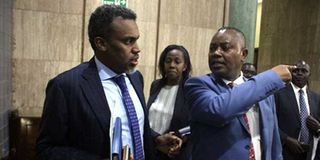Poisoning Haji-Kinoti feud with 2022 politics will hurt graft war

Director of Public Prosecutions Noordin Haji (left) and the Director of Criminal Investigations George Kinoti.
What you need to know:
- Politics aside, it would be difficult to trust the DCI, whether that be Mr Kinoti or anyone else, as an apolitical and independent prosecutor.
Cleverly left out in the reports was that the High Court did no establish anything new; it simply confirmed existing provisions.
It may have seemed like a simple restatement of the law when the High Court ruled that the police have no power to charge suspects in court without the approval of the Director of Public Prosecutions.
Justice George Odunga was ruling last week on a constitutional case filed by former National Water Harvesting Authority boss Geoffrey Sang, who was arrested in April over graft.
The ruling could have far-reaching ramifications beyond the turf wars between Director of Criminal Investigations George Kinoti and Director of Public Prosecutions Noordin Haji. The conflict has adversely affected the war against corruption, with Mr Haji having blocked a number of high-profile graft cases that Mr Kinoti had tried to independently prosecute.
Beyond what looks like petty turf and ego wars, however, is high-octane politics that directly touch on the now open feud between President Uhuru Kenyatta and his deputy, Dr William Ruto.
State House mandarins are paying keen interest on the matter with the State Law Office tasked to look for a way out of the logjam.
Mr Kinoti argues that, by refusing to act on some of the investigation files he forwards, or impeding cases he tries to directly prosecute, Mr Haji is sabotaging the corruption war.
SYMPATHY
This view seems to have won sympathy at State House. A likely recommendation might be that the law be changed to give the DCI leeway to bypass the office of DPP and directly prosecute cases in court.
At the centre of everything is politics around the anti- corruption campaign. Ever since President Kenyatta launched the war on corruption with a 2015 State of the Nation speech which forced the ouster of five Cabinet ministers, Deputy President Ruto’s wing of the Jubilee Party has complained it was the real target.
President Kenyatta’s second and final term saw him relaunch the faltering war as one of his legacy projects amid open differences with his deputy around the presidential succession and the emerging alliance with opposition chief Raila Odinga.
If the State Law Office paid close attention to the Justice Odunga ruling, so did Dr Ruto’s office.
From early on, Mr Kinoti and Mr Haji — appointed within a few months of each other in early 2018 — were seen as a potent new partnership adding impetus to a previously rudderless war against graft.
‘SLAY QUEENS’
But they also attracted equal opprobrium from the Ruto camp. The DP’s social media warriors launched vicious attacks on both men, giving them the derogatory label of ‘slay queens’. Now, the same camp sees Mr Haji as their defender against supposedly political investigations pursued by Mr Kinoti.
Their biggest fear is that there may be a move to nail Dr Ruto on corruption charges, which would then expose him to impeachment proceedings.
While there is no evidence that Dr Ruto’s acolytes have been unfairly targeted, it is undeniable that a sizeable number of the politicians and public servants under the radar have been his allies or have been quick to seek political shelter under his wings.
The anti-corruption war in Kenya, dating back to establishment of the original Kenya Anti-Corruption Commission (Kaca) in 1997, has featured tussles over prosecution powers.
This was for obvious reasons. Independent investigative bodies were established because the DPP — and the previous prosecution boss, the Attorney-General — were openly partisan.
When prosecution was just a department under the office of the AG, up to the mid 1990s, it was simply an extension of the political establishment.
INDEPENDENT BODY
The 2010 Constitution further entrenched the office of DPP as an independent body, mandated to function without direction or influence from any other organ. The office of the AG, however, remains an appendage of the Executive, and any recommendations it makes on sensitive issues will be seen from that perspective.
Politics aside, it would be difficult to trust the DCI, whether that be Mr Kinoti or anyone else, as an apolitical and independent prosecutor.
Following the ruling, the DPP’s office swung into overdrive, pushing the spin that thousands of ongoing investigations and prosecutions across the country would grind to a halt.
Cleverly left out in the reports was that the High Court did no establish anything new; it simply confirmed existing provisions.
Moving on that basis to change the law or force Mr Haji out of office will only reinforce suspicion that it is all politics. The better option would be to have Mr Kinoti forward case files with watertight evidence so that Mr Haji cannot trash them without exposing himself.
[email protected] www.gaitho.co.ke @MachariaGaitho





